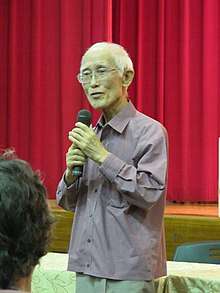Yu Kwang-chung
| Yu Kwang-chung | |
|---|---|
 Yu Kwang-chung in 2011 | |
| Native name | 余光中 |
| Born |
21 October 1928 Nanking, Republic of China |
| Died |
14 December 2017 (aged 89) Sanmin District, Kaohsiung, Taiwan |
| Language | Mandarin and English |
| Nationality | Republic of China |
| Education | MFA at the University of Iowa, USA |
| Alma mater |
National Taiwan University University of Iowa |
| Period | 1952–2017 |
| Notable works |
Lanse de yumao (Blue Feather) Zai lengzhan de niandai (Cold War Years) Yu yongheng bahe (Tug-of-war With Eternity) |
| Notable awards | Order of Brilliant Star |
Yu Kwang-chung (Chinese: 余光中; pinyin: Yú Guāngzhōng; Wade–Giles: Yü Kuang-chung; 21 October 1928 – 14 December 2017) was a Taiwanese writer, poet, educator and critic.
Life
Yu was born in 1928 in Nanking to Yu Chaoying and Sun Xiujun, but fled with his family during the Japanese invasion.[1] After returning to Nanking many years later, he again was forced to flee due to the Communist victory in the Chinese Civil War. Yu and his family fled to Taiwan via Hong Kong in 1950 with the Kuomintang-led Government. Yu entered the University of Nanking for English Major in 1947, and then transferred to Amoy University. He enrolled at National Taiwan University and was one of the first students to graduate with a degree in foreign languages. He held a master of fine arts degree from the University of Iowa.
After graduation, he began his career as a university teacher in 1956. He joined the faculty of National Sun Yat-sen University in 1985.[2] He taught in the United States, including at Gettysburg College.[3] He was awarded a National Award for Arts in 1989 and a National Cultural Award in 2014.[4]
Yu died on 14 December 2017 from pneumonia, at Chung-Ho Memorial Hospital in Kaohsiung.[5][6] He was married to Fan Wo-tsun from 1956 until his death.[7]
Works
He published 17 poetry collections and 12 prose collections. Yu's poetry since the 1970s had focused on the theme of longing for China felt by many Mainland Chinese soldiers and Nationalist Government workers who fled to Taiwan after the Chinese Civil War.[8]
Yu's works often focused on four fundamental aspects of literature; namely poetry, prose, translation, and commentary. Among writers using Chinese, Yu Kwang-chung became well-received to readers by showing innovative humour in his essays, exhibiting wit in his appreciations, and evincing his understanding of humanistic culture in his poetry.
A former professor at the Chinese language and literature faculty at the Chinese University of Hong Kong, Yu was internationally acclaimed for his command in traditional Chinese as well as modern literature. Besides his proficiency in the English language, for which he had been appointed professor at departments of English in Taiwan and the USA, Yu was also an eager learner of languages, especially European ones. He spoke French, German, Spanish, and Italian, languages which he sometimes cited in his Chinese essays when juxtaposing the Chinese and Western cultures. He also learned Russian.
See also
Reference
- ↑ Qin, Amy. "Yu Guangzhong, Exiled Poet Who Longed for China, Dies at 89". New York Times. Retrieved 22 February 2018.
- ↑ Cheng, Chi-feng; Chang, S.C. (26 April 2018). "Poems read at remembrance service for Yu Kwang-chung in Kaohsiung". Central News Agency. Retrieved 26 April 2018.
- ↑ Land without ghosts: Chinese impressions of America from the mid-nineteenth
- ↑ "Yu Kwang-chung, titan of Taiwan literature, passes away at 89". Taiwan Today. 15 December 2017. Retrieved 22 February 2018.
- ↑ Lo, Yuan-shao; Chang, Jung-hsiang; Yeh, Su-ping; Chang, Shu-ling; Kao, Evelyn (14 December 2017). "President Tsai expresses condolences over renowned poet's death". Central News Agency. Retrieved 14 December 2017.
- ↑ Gan, Nectar (2017-12-14). "Poet Yu Kwang-chung dies in Taiwan aged 89". South China Morning Post. Retrieved 2017-12-14.
- ↑ Huang, Hsu-lei; Chin, Jonathan (15 December 2017). "Poet Yu Kwang-chung, 90, dies in Kaohsiung". Taipei Times. Retrieved 15 December 2017.
- ↑ Eternal Youth Unbounded Passion. Sinorama 1/2010
| Wikimedia Commons has media related to Yu Guangzhong. |
| Wikiquote has quotations related to: Yu Kwang-chung |